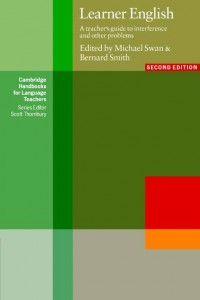Spanish speakers
I’m having a bit of a tidy-up and came across the little book of useful notes I made to help me revise for my Diploma exam. There were a few pages dedicated to problems which Spanish speakers can have:
Pronunciation
- consonant clusters – they tend to add a vowel sound or elide a consonant sound
- they have a narrower pitch range
- the schwa doesn’t exist
- there are a limited number of vowel sounds
- Latin-root cognates may have a different pronunciation e.g. study / estudiar – also often linked to the limited number of vowel sounds
Grammar
- lack of subject pronouns in verb phrases
- grammatical gender
- adjectives follow the noun and also show gender and number
- freer word order
- no auxiliary do used in questions or negation
- similarity of form vs. similarity of function
- The definite article is often used with a general meaning
Lexical
- false friends e.g. sensible / sensitive
- plural of the male form
- more likely to use Latin-root words where we might use phrasal verbs
There is a fabulous section in the book Learner English (Michael Swan and Bernard Smith) which has further information on speakers of Spanish and a wide variety of other languages.
